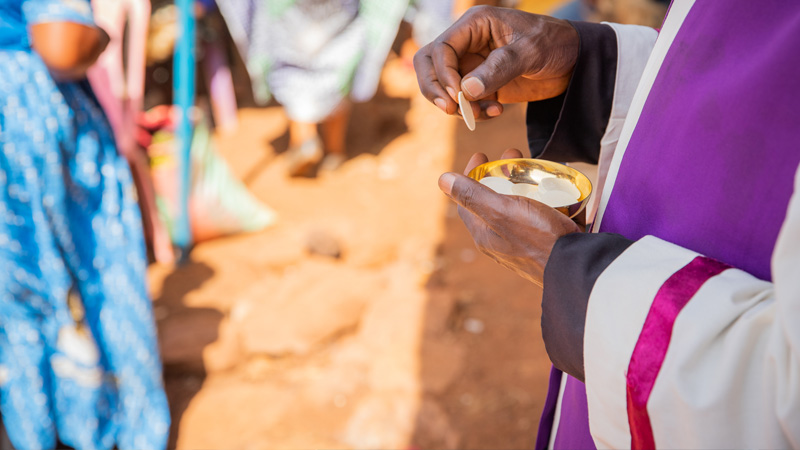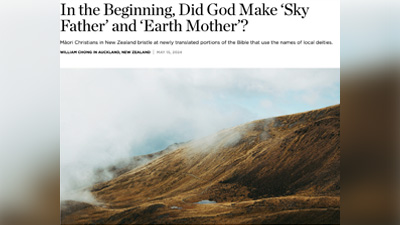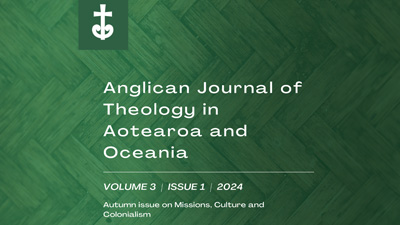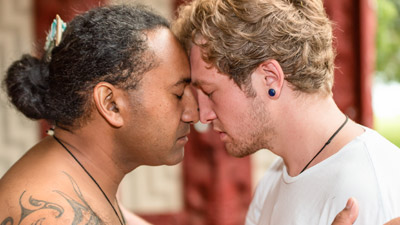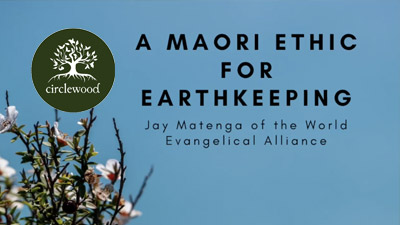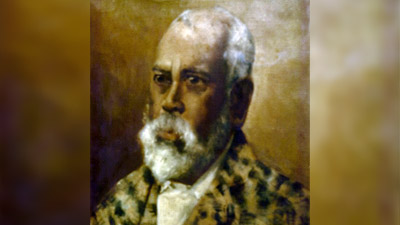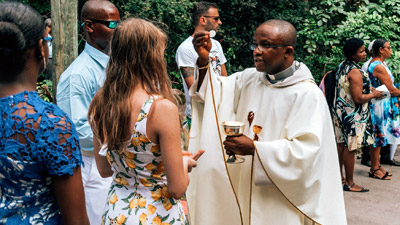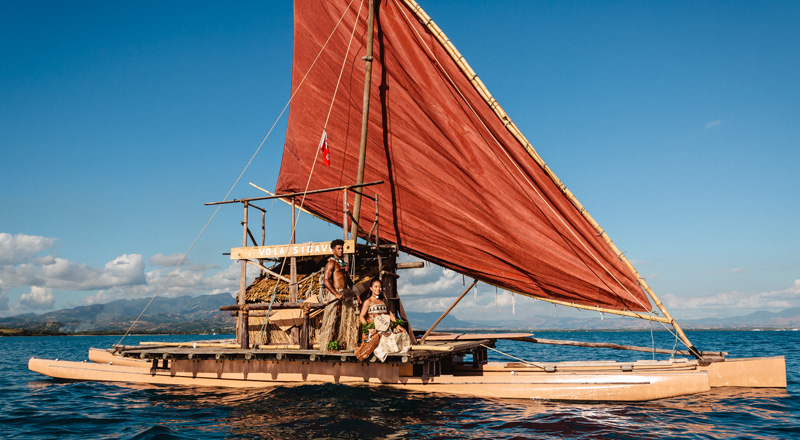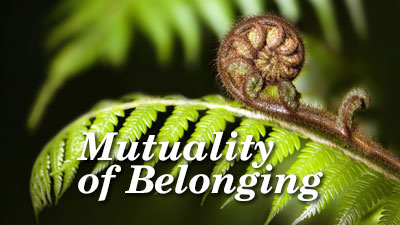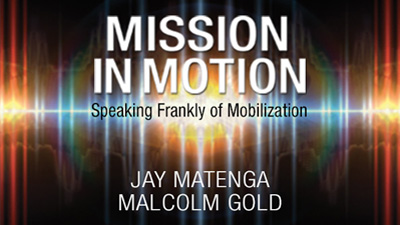
Reading The Environment
Subtitle: Indigenous Ways of Knowing & Communicating in Context
A chapter for a series to be published online by the Institutes for Orality Strategies for their Global Orality Mapping Project focused on promoting the sharing of the gospel among oral communicating peoples.
This chapter highlights the dynamic relationship that oral/indigenous people have with their environment. It draws on a case study from the Aleut peoples of the Bering Straits and supplements it with personal experience from a te ao Māori perspective and research conducted among Australia Aboriginal people. The godwit connect Aluet and Māori in unexpected ways.
Why Collaboration?
Subtitle: Refocusing Our Theology On Cooperation.
A short presentation for a meeting of International Partnering Associates in Istanbul Turkey, 2-6 December 2024
In this paper I provide International Partnering Associates with a reframing challenge as they discuss the role of collaboration in global missions. I challenge the very assumptions around collaboration language and the way it manifested at the recent Lausanne 4 Congress in unhealthy and unhelpful ways based on flawed industrial-influenced theology. I suggest cooperation in cocreating New Creation in participation with the purposes of God is a healthier orientation for cross-cultural or transborder ministries.
Cocreating: From Missio to Prothesis
Subtitle: Preparing for a New Era of Global Witness
A presentation to the Annual General Meeting of Missions Interlink New Zealand on the occasion of my formal farewell from the role of Executive Officer, 28 November 2024.
In this presentation I leave the Missions Interlink community with a challenge to prepare well the next generation of missionaries from and to Aotearoa New Zealand for the ‘new era’ realities currently facing missions as a practice alongside a maturing world Christianity. To better engage this new era, I propose that the old terminology of “missions” be made redundant in favour of a better framing of our global witness as participation in God’s purposes. Here, I introduce for the first time the concept of prothesis (purpose), launching from a fresh translation of Romans 8:28 and focusing on the purposes of God rather than the sending of God.
Indigenous Missions in Today's Contexts
This paper is a transcript of a presentation I delivered to the Asia Evangelical Alliance Mission Commission on 31 August, 2024.
I spend much of the talk defining the different terms I was asked to speak about: contexts, indigenous, and a way to rethink missions for today’s (and tomorrow’s) world. I speak about the “outside-in” problem where local Christians are unhelpfully influenced by externally imposed theological ideas, delivered as orthodox doctrine when in fact they are theological concepts developed in foreign contexts. I briefly introduce my expanded Industrial (inidividualist) and Indigenous (collectivist) schema to help explain the benefits of both but the need to let locals lead within any given place. I conclude with a shift from “missions” to “participating in the purposes of God” as a less Industrial way of conceiving the missio Dei.
Short-Term Missions for Mutual Transformation
Audio Only YouTube
This interview is a discussion based on my contribution to the book Re-Imagining Short-Term Missions in a chapter titled, The Mutuality Motivation.
From the interview blurd: what would happen if short-term mission trips were built around values of mutual transformation—instead of the usual top-down, one-way dynamic of “service”? What if Christians in the global north really believed that their brothers and sisters in the global south could help them understand God and the world in new, liberating ways? Or that short-term trips could be opportunities for visitors and hosts alike to be changed and challenged by one another through mutually respectful, coequal exchange?
Hoodwinked
Subtitle: This is a Missions Program!
A copy of an article about my experience of the Perspectives on the World Christian Movement via the South Pacific version of the Study Programme developed in Aotearoa New Zealand from the core content compiled in the United States of America. The article was published in the Mission Frontiers magazine, May/Aug 2024, celebrating the 50th Anniversary of the Perspectives Study Program.
In this essay, I track the impact of the study programme when my wife and I did it back in 1990. We pinpoint our involvement in global missions to that period of our lives, immediately following our marriage. The essay includes an overview of the development of the course in Aotearoa New Zealand, which saw hundreds of New Zealanders like ourselves out of the thousands of students who were motivated into cross-cultural missions by the South Pacific Perspectives Study Programme.
Contemplating Powers
Subtitle: A Piece of a Conversation.
With this paper I archive my 2 June 2024 response from an email conversation with Stan Nussbaum, a US American independent mission innovator, researcher, and writer with wide international experience. Stan expressed concern that my promotion of Indigenous perspectives in missions may be too dismissive of the existing Industrial paradigm. Stan argued that there remains a place for individualist values in the missions community (and conversation). He spoke of his concerns about Christian nationalism and other nationalisms arising around the world (which an over emphasis on indigenity could inflame). Stan also asked my opinion about a paper he was working on for the US Evangelical Missiological Society, a paper that borrows heavily from Don Richardson’s redemptive analogy concept (e.g. Peace Child), applied to the US cultural context, proposing that the “public awareness campaign” could serve in a similar way as a concept that could convey gospel meaning.
Missions in Global Complexity
Subtitle: Navigating Participation in God’s Purposes.
A 2024 commission for a chapter in a book that will be a primer on what is commonly called missions, translated and published in Portuguese primarily for a Brazilian audience. It has been lightly edited for reproduction in English here.
In this paper I shift from what is classically known as “missions” by the Evangelical missionary industry to what I consider to be a better biblical rendering as “participating in God’s purposes”. As we do so we seek to co-create New Creation under the Lordship of Jesus in any given context. The global Church faces numerous challenges as it seeks to serve the purposes of God in our post-pandemic generation. From my indigenous perspective, I view these challenges like night-sky constellations that can help guide us toward our ultimate destination of New Creation in our chosen contexts as we participate in the purposes of God to be blessing to our societies and the environment around us.
Report On The He Timatanga Translation
Article Title: In the Beginning, Did God Make ‘Sky Father’ and ‘Earth Mother’?
A link to a 15 May 2024 Christianity Today article exploring the challenges of creating a ‘modern’ translation of the Bible in contemporary te reo (Māori language). Myself and a few other Māori Christians were interviewed for and quoted in the article.
Among the quotes,
Jay Mātenga, executive director of the World Evangelical Alliance’s Mission Commission, noted that the earliest Māori Christians saw atua Māori not as mere symbolism but as gods who had real power. “So reviving knowledge of spiritual deities flippantly, without the means to navigate the relationship as the tohunga did, is spiritually ignorant and risky,” he said.
“Like cultures, every language is dynamic,” said Mātenga. “From the 1970s, te reo [the Māori language] has undergone what is perhaps one of the most successful language revitalization processes in the world.”
Whatever Happened to Missionary Enthusiasm?
Subtitle: A Response to Brian Stanley.
Professor Brian Stanley’s preceding article (of the same title) in this edition of the Anglican Journal of Theology in Aotearoa and Oceania (Vol 3.1, April 2024) addressed shifts in missionary thinking up to the 1960’s along the stream that became the Ecumenical movement. In my response I track a continuing ‘decline’ along the Evangelical stream up to the present day. While the word ‘decline’ is used, it should be more accurately identified as a shift (in the Evangelical contexts at least) because missions continues, but not in the classical (post-1790’s) understanding commonly known as the “modern missionary movement”.
My article begins on page 49 following Professor Stanley’s article. The entire edition is linked here because my contribution would make less sense without the context provided by the other articles, especially Professor Stanley’s.
The Wellbeing Imperative Discussion
A podcast discussion with Frontier Ventures’ “Missions Drop” released on 10 April, 2024.
Jay discusses the content of his June 2023 blog post with Frontier Ventures’ Andy Bettencourt.
From the original blogpost blurb, “Until very recently it seems, Western Christianity has been solely focused on ‘the dark side of the moon’-a pathological perspective of humanity. We should have no illusions about sin’s devastating effects, but neither should we lose sight of our inherent goodness. Missions needs a shift in perspective towards wellbeing.”
The podcast can be found here: https://themissionsdrop.libsyn.com/site/a-missiology-of-well-being-with-jay-matenga.
Whose Side Are You On?
Subtitle: 2023 Reflections on the State of Global Missions
A missions related 2023 forecast originally prepared for the World Evangelical Alliance Mission commission, published 5 January 2024.
This essay is my annual missions forecast, in which I highlight seven major issues using Joshua’s encounter with the Commander of the Lord’s army (Joshua 5:13b) as a biblical foundation. Polarisation continues as pressure comes on people with differing histories and values struggling to live with or near each other. It is becoming increasingly apparent that the liberal globalization project is failing to achieve the peace promised by a vision of mutual economic prosperity. People with power have grown tired of restraint and are showing their true colours. The peace of Christ differs markedly from worldly visions of peace, which ultimately fail to bring forth that which they promise. The peace of Christ is only found where New Creation is manifest because there, where as few as two or three gather, is found the presence of the Creator—the King of the Kingdom of God.
Reimagining Mobilisation
Subtitle: A Call For Realignment.
The transcript of a paper presented at the 2023 Global Mobilization Network Conference in Chiang Mai, Thailand.
In this paper I revisit theological and missiological assumptions that led to the development of the missions mobilisation industry from the mid/late-1990s up until the global pandemic at the start of the 2020’s. The pandemic marks a new era of missions that call into question many of the assumptions that guided the former era and therefore also call for a reimagining of our assumptions about participating in God’s mission. Here I argue that we need to repent of our anthropocentric perspectives of God’s mission and realign ourselves to a pneumacentric commitment: to obedience to the Holy Spirit as the sole determiner of how we ought best to participate in what God is doing.
This presentation is also available as a video on YouTube here: https://www.youtube.com/watch?v=s7mkr2GliCk.
Will To Knowledge
The transcript of a paper presented at the 2023 New Zealand Christians in Science Conference, “The Fall in Science and Theology .
In this paper I propose that we should view Sin (capital S) as the capacity to determine what is good and by implication judge between that good and that which is not good. I view this addition to the human condition at the event we commonly call ‘The Fall’ as the problematic source of all interpersonal dysfunction in the world, from marital and familial breakdown to international conflicts. From the theology of the Apostle Paul (in particular but not exclusively) I position the Holy Spirit as an external source available, through allegiance to Jesus, to humans that enables us to overcome Sin in our mission to co-create New Creation as participants in the purposes of God, leading to a consummation when all things will be made new in fulness at the physical return of Jesus.
The Relevance of Rupture
Subtitle: The Road to Maturity.
The transcript of a two-part seminar prepared for the New Zealand Association of Christian Schools’ 2023 National Conference.
In this paper, incorporating two seminars, I introduce the processes that lead to our sanctification, our set-apartness for God’s purposes, otherwise known as holiness. I explain that this process, of rupture and repair, is one that requires perpetual reconciliation. To better understand our current (global) context and the need for such a process, I begin by explaining my Industrial/Indigenous spectrum, identifying the need for, and benefits of, middle-ground integration in the tensions of difference. Once established, I zoom in to that middle ground to look at the transformative process from biblical, neuroscience, and practical perspectives for the healing of our communities and, ultimately, the healing of the nations.
Indigenous Epistemologies
A paper prepared for the Korean Global Mission Leaders Forum, November 2023 in South Korea. The theme of the gathering is “The Gospel of Hope: Missional Responses to Environmental and Human Calamities”
In this paper I note that we are living at the conclusion of a shift away from the Enlightenment towards something new, generated by questions arising out of the very globalized reality that the spread of the European diaspora and global trade created. From early in the twentieth century, amplified by the second world war, the central question that emerged among those concerned about international relationships and global stability is something like, “how can we all get along?” I contend that an Indigenous understanding of reality opens up a new perspective about God and creation, connecting Christ with creation, which can greatly expand our understanding of God’s mission and our mandate to co-create new creation as a response to the central question. I illustrate this from my walk in the Māori world.
That They Will All Be One
Subtitle: The Transformative Potential of Ethnos, Phyle, Laos, and Glossa for Global Missions Today.
An article prepared for OMF’s May 2023 Mission Research Consultation on the theme of: Ethnicity, Race, the Bible, and Mission. The article is published in OMF’s Mission Roundtable Journal here: https://omf.org/resource/mrt-18-3-dec-2023-one-people-uniting-in-gods-mission/
A long-from article that investigates the significance of the variants of “every, tribe, language, people, and nation” in Revelation, linking them with the antecedents in the Old Testament (and, by implication, the gospel equivalents — all nations, all the earth, all creation). God’s desire for (a representative of) people from all nations to shift from Babylon to New Jerusalem has significant missions implications — which I summarise as the act of co-creating new creation in-Christ. The article starts in Revelation with the ultimate formation of a people from all nations, then considers new creation from all nations, and highlights the challenges of co-creation with all nations (touching on issues of racism and colonisation, etc).
The blessing of diversity
Subtitle: Benefits of the emancipation of Indigenous theologies in light of the emergence of World Christianity
An editorial and article published in CMS UK’s ANVIL Journal Vol 39 No. 1, May 2023. Clicking the image will download only my contribution. The full journal can be downloaded here: https://churchmissionsociety.org/wp-content/uploads/2023/05/Church_Mission_Society_Anvil_Volume_39_Issue_1.pdf
In the long-form article I consider the rise of World Christianity (as a reality and a discipline) alongside increasing globalisation and note a correlated rise in confidence among Indigenous believers in Jesus (aka Christians in the Majority World, Global South, Developing World, etc.). Post-colonial realities and increased cultural and religious pluralism have created space for theologians from ‘younger’ churches to find their voice. Leveraging the metaphor of clarity (seeing clearly) I argue that listening to these new voices is a pathway to deeper maturity in Christ.
Singularity As Gospel Witness
In this talk I identify from the New Testament that the Church’s primary witness to the world is for believers in Christ to live as an “integrated singularity”, by which the world will believe and know that the Holy Parent lovingly sent the Son, the peace-giver. This integrated singularity, revealed in Jesus’ prayer of John 17 by his reference to “make them one as you and I are one”, is achieved not by consensus, agreeing to disagree, or avoidance but by living within the tensions of our differences and processing them well to co-create a new mutually beneficial future. This requires a few core elements such as vulnerable ‘pourousness’ (openness to one another and the Holy Spirit), kenosis (self-giving/yielding), and co-learning and co-labouring in a state of perpetual reconciliation. Easier said than done, but well worth the living sacrifice.
The New Era of Missions
The transcript of a two part seminar presented at the Missions Interlink Australia National Conference, Melbourne July 27 & 28, 2022, “New Times Call For New Ways”.
In this presentation I challenge existing paradigms of the global missions industry, contrasting the differences between an industrial perspective of missions (the industrial rift) and an indigenous perspective (the indigenous shift), with the objective of highlighting gaps for effective counterpointing between the two that can help us strengthen participation in God’s purposes for the world for a new era of what has typically been called missions. I identify each perspective as an epistemé, an ecosystem of knowing, which I have mapped elsewhere on a spectrum between extreme individualist and collectivist ways of knowing the world with a sphere of hybridity existing at the intersection of the two knowledge ecosystems. Focusing on the limitations of the industrial rift is necessarily difficult for existing missions workers to hear. It is important to establish a rupture (exposing gaps) so that the beneficial aspects of an indigenous shift can find legitimacy in God’s global purposes (especially the cross-cultural missions aspect of those purposes) to help us move forward.
Indigenous Implications for the Future Wellbeing of Missions
A paper presented at the WEA Mission Commission Online Conference, April 8 2022 (via Zoom).
In this paper I once more addresses the need for unity in the Body of Christ, and explain my Indigenous and Industrial ‘schema’ as a way to view differing ways of knowing and interacting with the world and the need for the global Church and missions to learn to counterpoint the differences. I argue that it is as we sit in the tensions of counterpointed difference that we grow into the full maturity that James and the other Apostles present as the core purpose of Christ’s body, the Church, in its local, national, and global manifestations. It is by our reconciled interrelational harmony that world will believe and know that the Father lovingly sent the Son (per John 17). But, in order to develop true harmony (or maturity), we need to create space for the Indigenous voice to be heard in counterpoint to the dominant Industrial voice.
Indigenous Future of Missions
A seminar presented to Global Connections UK February 14th, 2022 (via Zoom).
This seminar provides a thumbnail sketch overview of some of the issues arising from my exploration of two global epistemic domains: Indigenous and Industrial, and the significance of these schema to the current state of Evangelical world missions. The title is not meant to suggest that the future of missions will ‘only’ experience changes around the issues of indigeneity, but, since historic evidence shows that world Christianity spreads as indigenous faith, I believe the future of missions will be significantly influenced by centring the local and allowing indigenous values to guide the practice of missions forward into a healthier intercultural experience. other articles listed below, particularly Centring The Local, develop these concepts also, but in slightly different ways.
The Great Inversion
A missions related forecast originally prepared for the World Evangelical Alliance Mission commission, published 24 December, 2021.
This article proposes a missions forecast update using Mary’s “Magnificat” as a framework to reflect missiologically on the year gone and its potential effects on global missions going forward. The global pandemic continues to frustrate and humble the global missions community around the world. 2021 has been a year of great suffering and set-back in terms of health and well-being, with a resource crisis on the horizon. The stress created by the pandemic has amplified competing social and theological convictions, resulting in increased polarisation. Geopolitical instability is also growing, with potential to be an additional threat to missions strategies. And yet, God’s purposes prevail. The question remains: are we fulfilling or frustrating those purposes?
Indigenous Relationship Ecologies
A lecture originally presented to MA Students at CMS UK’s Pioneer Mission Training on November 2, 2021
This lecture provides something of a personal approach to some issues around an indigenous Christian approach to the environment. Videos concerning environmental change and water care issues, featuring members of the indigenous tribe that I belong to were edited and leveraged as talking points for the lecture. Links to the full-length videos are provided in this article. Taking the time to view the powerful first-hand accounts will ensure that my commentary and reflections make sense in context. The lecture weaves a narrative around the videos, focusing on the significance of space, spirituality and sharing from an indigenous perspective for an integrated (or wholistic) approach to environmental concerns, and touches on some pertinent theological issues that arise.
The Mutuality Mandate
A paper originally presented at the All Nations Christian College Global Get Together on June 19, 2021
COVID-19 has given the global missions community a great pause for thought and an opportunity for emerging missions thinking to accelerate its influence and lead us into a new way of practicing missions in the era ahead. In this presentation, I articulate how a reorientation of our Biblical understanding of missions can help reframe our practice of missions. I anchor my thoughts on John 17:18-26, a passage that I call The Great Commitment. From here, I argue that our loving unity, integrated into God in-Christ, is the only strategy for our participation in the mission of God that Jesus ever gave. It is by this that the world will believe and know that the Father lovingly sent the Son, and by this the Father is glorified.
Kotahitanga & Koinonia in Shalom
An article commissioned by the World Council of Churches’ Commission on World Mission and Evangelism, published in the International Review of Mission, Issue 110.1 (412), May 2021, “Reconciliation As A Missional Task”. The article is reproduced here based on the author’s interpretation of the contract with Wylie. (Source of published article: https://doi.org/10.1111/irom.12322).
This paper, sensing a tipping point in evangelical thought as we emerge out of global pandemic disruption, proposes a framing of church and missions from the collectivist perspective shared by those less affected by the influence of Western industrialization and individualism. It proposes that both the means and the objective of the mission of God should be common unity in-Christ.
A Māori Ethic for Earthkeeping
A podcast interview with Forrest Inslee of the Circlewood earthcare network in the USA. Recorded over 2 hours prior to Easter, the reduced 40minute version was formally released on May 24, 2021.
In this episode, I talk with Forrest about my perspective of Creation Care, its associated indigenous theology and the implications for missions. The podcast creators introduce me as “known for bringing unconventional thinking to his work—perspectives that confront status quo assumptions, and call into question what he calls the “industrial ethics” that cause us to be separated from the earth, and from one another. From his grounding in indigenous Maori culture, he offers thought-provoking insights that “cut new grooves of understanding” about how we might live differently with our ecologies.”
Legacy: The Faith Of Our Forefathers
A talk originally prepared for the Botany Elim Men’s Group series, “The Faith of Our Fathers” – May 17, 2021.
In Evangelical Christian circles, particularly those dominated by Western perspectives of the faith, our personal heritage does not tend to feature significantly in our understanding and practice of faith in Jesus Christ. We can misinterpret the promise that we are ‘new creations’ in Christ, that the old is gone and the new has come (2 Corinthians 5:17), even when we experience evidence to the contrary. It helps to understand that that piece Scripture refers to our relationships with one another, not our relationship with ourselves. In this talk, I explore the implications of our genetic heritage on our identity in Christ, our ‘best contributions’ to the Body of Christ, and the unique blessing we can be to the world around us.
'Post'-Pandemic Missions
A seminar originally presented at the Mission Leaders Forum, Overseas Ministries Study Centre, Princeton Seminary – April 24, 2021.
The pandemic may have locked down the world, but God’s mission continues. In this transcript I recall the indigenous spread of the Christian faith throughout history and affirms local expressions of the faith as having the most positive potential for societal wellbeing. I introduce Indigenous and Industrial as two complementary values systems in the world and call the global missions community into a new era of integrated cooperation for the sake of God’s glory beyond the boundaries of local church influence.
Centring The Local
A presentation prepared for Wycliffe Global Alliance/SIL Asia-Pacific’s “Together in Christ 2021” Conference – January 19, 2021.
This presentation is also available to view on YouTube.
In this article I call on the global missions community to prioritise the local, the host recipients of the gospel. Rather than ‘decentring’ the influence of the outsider, I encourage centring: an empathetic appreciation of the insider’s perspective in cross-cultural missions relationships. I argue that the grace of God is experienced differently among different groups of people so that the particular or local experience can be shared as blessing to the universal or global body of Christ. Loving interaction in our integrated relationships in-Christ is a means to both the maturing of the saints and a witness to the world, so they will believe and know.
Centralizando o Local (Portuguese Translation)
Neste artigo, faço um chamado à comunidade global de missões para priorizar o local, os receptores hospedeiros do evangelho. Em vez de ‘descentralizar’ a influência do estrangeiro, incentivo a centralização: uma apreciação empática da perspectiva do interno nos relacionamentos de missões transculturais. Argumento que a graça de Deus é vivenciada de maneira diferente entre diversos grupos de pessoas, de modo que a experiência específica ou local possa ser compartilhada como bênção para o corpo universal ou global de Cristo. A interação amorosa em nossos relacionamentos integrados em Cristo é um meio tanto para o amadurecimento dos santos quanto para testemunhar ao mundo, para que eles possam crer e saber.
To The Ends of the Earth
A message prepared for Rutland Street Church, Christchurch New Zealand – May 10, 2020.
Here I counterpoint two very different authors’ perspectives and argue that they are refering to the exact same things. Luke’s account in Acts 1:8 and John’s recollection of Jesus’ prayer in John 17:18-25. I emphasise that in Acts 1:8 (as elsewhere), when referring to “the end” coming, Jesus references the gospel being declared to “ends of the earth/all the earth/all creation/every creature” as an indicator of scope and promise, not aim or activity per se. The Holy Spirit’s power to witness (Acts 1:8) is the manifest glory of God (John 17:22f), which is the love of the Father for the Son, subsequently revealed by the Spirit through our loving unity as the witness to the world that leads it to know and believe. I posit that this loving unity ought to be seen as The Great Commitment, the actual objective of the mission of God.
Missions In An Age Of Authenticity: towards a new imaginary of missions
A paper presented at the Asia Missions Association Convention, Chiang Mai Thailand – November 14 2019.
Here I borrow from Charles Taylor’s philosophy that speaks of our era as an Age of Authenticity. In addition, I introduce Christian Welzel’s analysis of World Values Survey data that tracks social development in three phases culminating in the knowledge economy. Together, these hypotheses present a compelling picture of the values that increasingly inform globalisation even while the values of an old order continue to hold sway. I identify four issues that arise from an Age of Authenticity and then proposes a new imaginary (narrative) for missions, loosely drawing on the experience of the refugee.
Future Missions?
An article published in Mission Interlink’s September 2019 BULLETIN following a conversation involving 25 missions leaders from Aotearoa New Zealand at Carey Theological College regarding the future of missions.
Here I seek to add to a global conversation on the future of missions by reflecting on colonial-oriented motivations for missions in the past and suggesting that the future of missions beyond 2020 lay in a more communal orientation. Furthermore, if this motivation is to take hold, it needs to be passed on to the next generation.
So The World Will Know
A lecture presented at Laidlaw College, Henderson Campus, for the “Culturally Diverse Christian Communities” conference – July 5, 2019.
Here I focus on Christian unity and propose a way to reframe the challenges of difference within world-Christianity, and where Christ-followers from around the world converge in missions groups and culturally diverse congregations. I suggest a vision for intercultural growth as a desirable outcome of unity in Christ, which James the Just says is born of trial but is cause for great rejoicing.
Roots of Indigenous Ethics
A lecture presented at the Fairfield Conference on Ethical and Fair Trade, Auckland University of Technology Campus – March 9, 2019.
Here I present the roots of Indigenous ethics in relationship to the roots of Industrial ethics that guides global trade and, at best, provides parameters for ethical trade. I highlight spirituality and a belief in ‘life-force’ as core to an Indigenous ethic, with a deep sense of relationship enhancement as a resultant priority. Whereas the concept utility as a priority for the Industrial ethic is as good as a materialist construct can get.
Whanaungatanga: Theological Implications
A paper presented at Carey Baptist Graduate School’s Research Conference, in Penrose Auckland on September 20 2018.
Here I posit that the Evangelical church is struggling to remain relevant in the Western hemisphere because Evangelical theology is so closely aligned to, and defined by, rationalism. Setting the industrial/individualist West in one knowledge domain, I propose a way forward from an indigenous/collectivist domain. I introduce whanaungatanga as an interpretive lens that can reveal fresh understanding of our relationships with God, each other, creation and history.
Intercultural Hybridity
A lecture presented at Laidlaw College’s Research Conference, in Manukau Auckland on August 24 2018.
Here I introduce the concept of epistemé as a way of articulating how we know and are known in the world. I use it instead of ‘worldview’ as a more dynamic way of identifying difference between people with contrasting values. I argue that a middle way between the contrasts should be seen as intercultural hybridity – a desirable and beneficial outcome of living in the tension of difference, generating growth that ultimately results in unified harmony.
Indigenous Governance Principles (Christian)
A lecture revised for the Good Governance Conference on August 11, 2018. This was a day-conference for ministry and missions leaders and boards.
Here I unpack an indigenous Māori perspective, ‘kaitakianga’ (guardianship), which views governance as a responsibility to guide (steer), guard and nurture the resources available to an entity, ensuring that the resources and the environment in which they are found flourish. for a guardian/leader,
maintaining relational harmony or balance becomes an overriding priority
Growing Through Tension
A seminar presented at Laidlaw College’s Intercultural Church Conference – May 12, 2018.
Subtitle: “How James 1:2-3 can help fulfil John 17:20-23, by applying kaupapa Maori to help culturally diverse groups work through differences and witness to the world”.
Different Tongues One Language
A message presented on Pentecost Sunday in Auckland 2018.
Here I reflect on the Pentecost event when the promised Spirit of God was made available to all believers, reversing the effects of Babel and signalling the new Kingdom with a common language.
Indigenous Governance Principles (Mainstream)
A lecture presented at Otago Polytechnic, Auckland International Campus – September 29, 2017.
Here I unpack an indigenous perspective, kaitakianga, which views governance as a responsibility to guide (steer), guard and nurture the resources available to an entity, ensuring that the resources and the environment in which they are found flourish.
The Fish Scale (A Mobilisation Process)
Based loosely on the Engels Scale of conversion to Christianity, this article proposes a scale of involvement in cross-cultural ministry to guide those seeking to motivate believers to become engaged in propogating the gospel around the world as God leads them.
BOOKS
Mutuality of Belonging
Jay’s doctoral thesis: “Mutuality Of Belonging: Toward Harmonizing Culturally Diverse Missions Groups”
The research explicates relationship attributes drawn from life-story narrative interviews with Māori Christians as a Collectivist perspective. Individualist relationship assumptions evident in the missions community are identified from an analysis of post-1990 missions literature that specifically references culturally diverse relationships in the missions community. These attributes and assumptions are then counterpointed to show how each can enhance the other in missions groups.
Mission In Motion
The culmination of nearly a decade’s work researching motivations for mission involvement – October, 2016.
In this book we draw on a fire metaphor and explore the accelerants and retardants of the ‘missions flame’, participation in God’s mission (however that is understood by the participants).




